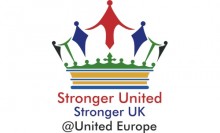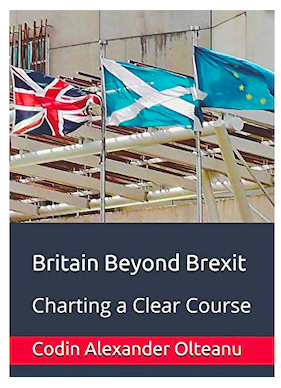Studies have shown that there is a clear correlation between levels of education and income and support for Britain's continuing membership in the EU. The higher such levels of education and occupation in the professions the higher tends to be the likelihood that such individuals will vote to stay in the European Union. The reasons for this are not difficult to discern: people who understand the complexity of the challenges we face in the 21st century are aware of the need of cross-border corporation in order to solve them and at the same time of the need to legitimate such decisions democratically in order to maintain our freedoms and our rights. At the same time professionals who will generally have attained a certain level of success in their lives, are materially at ease and have benefitted to some extent from Britain's economic upswing after the 2008 Global financial crisis have fewer reasons to be angry and frustrated than those who still struggle to make ends meet today, in what remains an uncertain and volatilr environment. Finally professionals - whether we talk about lawyers, accountants, doctors, business consultants, or entrepreneurs - are closely connected in everyday life with colleagues, partners and clients in other countries and have developed an understanding of the complex global environment we live in today and of the need for joint understanding, joint cooperation joint action.
Although professional associations tend to be neutral on political matters such UK’s membership of the EU the also have a duty to represent the opinions and the interests of their members. To take just one such example Britain's Chartered Institute of management accountants (CIMA) - the world’s largest and leading professional body of management accountants with more than 229,000 members and students in 176 countries - reported that UK management accountants want the UK to stay in the EU to protect British business. An internal opinion poll of CIMA members showed that “[t] he majority (63%) said they want to stay in the EU even if David Cameron fails to renegotiate our relationship with Europe”.
The poll also found that “[p]ositive sentiment towards the EU was consistent across all sizes of organisation and was high even with relatively low levels of interaction with other EU countries”, and that “over three-quarters (76%) want the UK to maintain EU membership and 80% stated they believe EU membership is good for British business. Only 7% thought that leaving the EU would have a positive impact on their own business”. Tony Manwaring, CIMA’s executive director, external affairs, said:
‘The role of management accountants is to assess all relevant information to decide what will best ensure the success of business now and in the future. On this basis, they have said that the UK’s membership of the EU is good for the UK. The majority of CIMA members want the UK to remain within the European Union at all costs.’
Although other professional organizations have not gotten quite this far in commissioning surveys on their members’ attitudes towards UK membership in the EU and then report their results in such an open and supportive manner of the ‘stay in’ option, it is highly likely that such results would be rather similar to those reported by CIMA.
Professional associations where the results might be rather more mixed could include those covering the legal professions, where questions of sovereignty and the relationship between British and EU legislation might have a greater impact on how its members view the benefits and disadvantages of membership in the European Union. Even in such cases there tends to be a significant support for UK membership in the EU, this time correlating with age rather than income. Younger members of the legal profession who tend to have completed at least part of their studies or of their professional training in legal environments outside Britain and are fluent in a foreign language will tend to be more supportive of UK membership in the EU than older, mainly male professionals with fewer such experiences and aptitudes but more entrenched at the top of their professions.
An example of a less direct political involvement in the ‘stay in’ / ‘leave’ Brexit debate, but clearly expressing support for the critical need of European cooperation and common standards in the field of justice, is the April 2013 endorsement by the Bar Council, representing barristers in England and Wales, of the finding of the House of Lords EU Committee that “the Government has not made a convincing case to opt-out of about 130 EU police and criminal justice measures and that to do so would have significant negative repercussions for the UK's internal security”. As its website states,
“The Bar Council is emphatically against an EU opt-out on the basis that it is contrary to the effective administration of justice, and will leave the UK isolated from the beneficial international agreements it currently receives. It is believed that an opt-out will reduce the protection of British citizens at home and abroad, will result in less efficient court processes, will have a negative effect on policing and judicial co-operation, is contrary to the promotion of the Rule of Law and the protection of human rights, and could result in a loss of influence on the European legal stage.”
Maura McGowan QC, Chairman of the Bar, went on to explain this context that:
"The opt-out will affect dozens of measures which are widely recognised as fundamental, which the UK would need to opt straight back in to. Some of these measures are critical to the UK's role in the international fight against terrorism and organised crime, the sexual exploitation of children and human trafficking, and the rapid extradition of criminals from our shores to face trial in other EU Member States, to name but a few. It is unclear how, and indeed if, it will be possible to opt-back-in to all of the essential measures. What is clear however is that significant costs will be incurred as a result, and the route to justice will be severely affected.”
Finally, the newly-formed group “Lawyers IN for Britain” (LIFB) made up of three former EU judges, 24 law professors, 30 QCs and 250 lawyers and academics, including partners in some of the UK’s leading firms, which is campaigning for the UK to remain part of the EU, has concluded that the “benefits of EU membership outweigh the burdens”. LIFB published a 300-page report claiming that “misconceptions” on everything from cutting red tape to the environment and access to international markets, are playing “a pivotal role” in the in-out debate. John Davies, chair of LIFB, said the aim of the 300-page report was to bypass the “great deal of misinformation” currently dominating the EU debate:
“The words we hear most from those yet to make up their minds, are ‘give us the facts’. We have done that – and our conclusion is that that the UK is safer, stronger and better off in the EU… Thousands upon thousands of new UK rules and regulations will be needed if the UK leaves. Separate international, bilateral and individual trade deals will need to be negotiated and drafted. New UK rules will still need to comply with many of the existing European rules. Far from offering a reduction in rules, the UK will be engaged in a ‘regulationfest’, needing a swollen Whitehall and an expansion in government lawyers, advisers and bureaucrats.”
Overall then professionals in Britain including the City of London tend to be supportive of Britain's continuing membership in the European Union. Their vote will play an important role in determining the outcome of the upcoming Brexit referendum.

